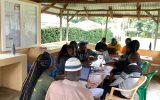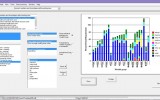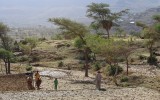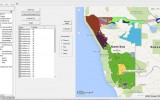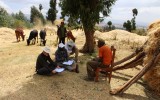Poverty research
Showing items 1 to 15 of 32
View Categories
- Areas of expertise
- Capacity building
- Climate change
- Data
- Disasters and emergencies
- Famine prevention and food security
- Gender
- Income diversification
- Inequality
- Lake Victoria fisheries
- Livelihood resilience
- Livelihood Zones
- Livelihoods
- Monitoring and evaluation
- Nutrition and health
- Open source
- Policy and programme design
- Post-conflict
- Poverty research
- Refugees and displacement
- Social protection
- Technology
- Urban
- Vulnerability assessment
- Countries
- Hydromet
- Methods
- Resilience
- The organisation
-
New insights from latest EfD / Nasio Trust IHM study in Kenya
Assessment of household livelihoods in Mumias West Sub County, Kakamega County, Kenya. Climate change means farmers need to adapt and the Nasio Trust is taking on this challenge, supported by new insights that IHM studies are providing. Building on EfD’s initial training Nasio’s local staff team re-visited households interviewed last year (see report here) allowing […]
-
Measuring poverty and livelihoods with The Nasio Trust: A baseline village study in Kakamega County, Kenya (2024)
Aware of increasing rates of poverty and growing demands on its services, The Nasio Trust which operates in western Kenya, commissioned EfD to conduct an in depth, quantitative household economy survey and training for its staff. The IHM study described in this report throws a clear light on the levels of poverty in Mumias West sub county, […]
-
Intern perspectives: My summer of data analysis with EfD
Andrew Armstrong I was working as a trainee Secondary School teacher in inner city London, coming to the end of my first year on the job. In the midst of a roller coaster, adrenaline-fueled term I felt I needed something of substance to add structure to my summer break. It was a strange thought, but […]
-
Banking on Evidence for Development – a month in the life of a volunteer
It’s August 2013 and I’m about as broke as a ‘banker’ in London can be. I had eagerly taken up my first position in the big city: interning at RBS’ risk department. That’s right, I had made it to the big time… And then rent happened… And bills… So with accrued holiday time but no […]
-
New HEA software developed by Evidence for Development
The household economy approach (HEA) is a method for assessing the vulnerability of rural populations to economic shocks and changes, based on their livelihood patterns and market information. It is now widely used as a method of famine early warning by many governments and humanitarian agencies, and also has important applications for managing the impacts […]
-
Baseline assessment of Malian refugees in Burkina Faso, Part II: Qualitative social and economic study (2014)
No single research methodology can fully explain why some households prosper in new and challenging situations while others do not, and nor can a single method answer fundamental questions relating to the underlying drivers of change within communities. This report complements the baseline study of household economies of Malian refugees in Burkina Faso , providing additional social and contextual information from Sag Nioniogo, Goudebou and Mentao refugee camps to support programming decisions.
-
Livelihood baseline assessment of Malian refugees in Burkina Faso: Quantitative analysis of household economies (2014)
This assessment was undertaken on behalf of UNHCR to provide baseline information on the livelihoods of Malian refugees in Burkina Faso, to identify opportunities for greater economic self-reliance, and to highlight risks and vulnerabilities of specific groups within the population. This report covers the three official refugee camps in Burkina Faso: Sag Nioniogo, Goudebou and Mentao.
-
The Household Economy Approach: Managing the impact of climate change on poverty and food security in developing countries (2014)
Also available at: http://www.sciencedirect.com/science/article/pii/S221209631400031X
-
Aid impact assessment and agricultural change: Researching ‘good enough’ qualitative approaches
Using public money to reduce global poverty is a tough enough ‘task’ even without having to account for each pound spent every five minutes. But aid professionals can hardly claim to be less susceptible to self-serving group-think than anyone else, and indeed the case for strong reality checks on aid expenditure will remain particularly strong […]
